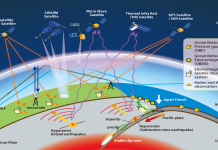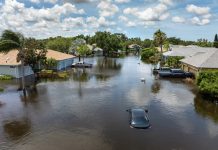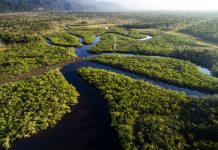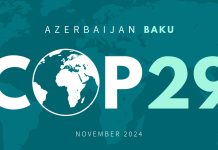Open Access Government produces compelling and informative news, publications, eBooks, and academic research articles for the public and private sector looking at health, diseases & conditions, workplace, research & innovation, digital transformation, government policy, environment, agriculture, energy, transport and more.
Home 2025
Archives
Horticulture: Hormonal therapy for grapevines
Jim Willwerth, Assistant Professor and Researcher at Brock University, Canada, in this horticulture discussion, delves into what we need to know about hormonal therapy for grapevines, including plant growth regulators.
How can carbon capture surfaces help the planet?
Beth McDaniel, JD, President of Reactive Surfaces highlights the potential of Carbon Capture Surfaces (CCS), an innovative and affordable of method using algae for CO2 removal, addressing the urgent need for scalable solutions to combat climate change.
10th Anniversary of the 2015 M7.8 Nepal earthquake: Explore new prediction technologies
Dr. Dimitar Ouzounov from the Institute for Earth, Computing, Human, and Observing (Institute for ECHO) at Chapman University and Dr. Angelo De Santis from the National Institute of Geophysics and Volcanology (Rome, Italy) are exploring new technologies for short-term earthquake forecasting and prediction, including the application of the LAIC approach to the 2015 Gorkha earthquakes in Nepal.
Does moving away from the climate disaster signal a departure from the hydrogen economy?
According to Adélio Mendes, a Full Professor at the Faculty of Engineering of the University of Porto (FEUP), moving away from the climate disaster does indeed signal a departure from the hydrogen economy, presenting a third pathway to consider.
The tenth anniversary of the Paris Agreement: COP30, failure, and renewal
The Conference of the Parties in Belém, Brazil, this November (COP30) will celebrate the tenth anniversary of the Paris Agreement (COP21 in 2015), but where, Richard Beardsworth asks, do things stand ten years on?
Catalyzing mineral weathering for permanent, safe and cost-effective carbon storage
Martin Van Den Berghe, CEO of Cytochrome, discusses catalyzing mineral weathering for permanent, safe, and cost-effective carbon storage.
Measuring permafrost thaw subsidence in agricultural fields in Alaska
Melissa Ward Jones, a Research Assistant Professor at the Water and Environmental Research Center (WERC) of the University of Alaska Fairbanks, discusses research focused on understanding the interactions of permafrost thaw and agriculture.
How climate extremes are endangering millions in Africa
Alain Tamoffo, Postdoctoral Researcher at the Climate Service Center Germany (GERICS), Helmholtz-Zentrum Hereon, discusses how climate extremes are endangering millions in Africa.
No safe haven: Why business leaders must act now to address Earth’s polycrisis
As hurricanes devastate former climate havens, learn why business leaders must embrace Sustainable Strategic Management to address Earth’s polycrisis before it’s too late.
Biochar technology to sequester billions of tons of CO2
This CDR champion industry, biochar, has proven technology that can quickly grow to sequester billions of tons of CO2. However, the industry has growing pains it must overcome to reach its extraordinary potential, James Gaspard, CEO of Biochar Now LLC, reveals.
Decarbonising the textile industry: A revolutionary pigment from the lab to the market in...
Explore the journey of decarbonising the textile industry through the remarkable example of bringing a revolutionary pigment from the lab to the market in three years, starting with the milestones of this captivating journey.
Climate change, water change and the critical role of community resilience
Dr. Amanda Shankland, Dr. Carolyn Johns, and Gail Krantzberg, explore climate change resilience, water change, and the critical role of climate-ready communities.
A novel approach to sampling microplastics
Applied Ocean Sciences is creating a sensor that is faster, more efficient, and less expensive than current sampling methods and will be the first sensor to allow near real-time abundance measurements for microplastics in a water sample.
Early warning signs in the Amazon: Tipping elements are not tipping points
Unveiling the relationship between society and the environment, a new research project sheds light on “tipping points” – critical thresholds beyond which change becomes abrupt and potentially irreversible.
Climate change, energy demand and health: Protecting vulnerable populations
Jo-Ting Huang-Lachmann, Junior Research Group Lead at the Climate Service Center Germany, discusses climate change, energy demand, and health to safeguard vulnerable populations.
What now? Climate leadership after COP29
Richard Beardsworth from POLIS at the University of Leeds continues a discussion on climate leadership, this time focusing on post-COP29 outcomes.
Primate exposure to anthropogenic pollutants: An overlooked conservation concern
Michael Wasserman of Indiana University discusses research on wild primate exposure to endocrine disruptors, such as pesticides, flame retardants, and phytoestrogens.
‘Remember, remember the month of November’: Ahead of COP29
Professor of International Relations at the University of Leeds, Richard Beardsworth, looks with concern to this November’s COP29 and the US elections. The issue is climate leadership.
AI to create personalised health responses to air pollution
Professor Fan Chung, Professor Christopher Pain and Claire Dilliway from Imperial College London, walk us through the exciting use of artificial intelligence to create personalised health responses to air pollution and invite you to get involved.
Seasonality and climate change: Challenges for physical activity in older adults
Research indicates seasonal variations in physical activity levels among adults in different climates due to temperature and humidity. Climate change’s increasing extreme weather may significantly affect physical activity in older adults already struggling to meet activity guidelines. Isabelle J. Dionne from the Université de Sherbrooke explains.





















